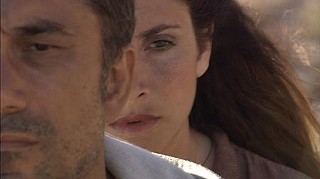Actually Living With War
AFS's latest Essential series, Children of Abraham/Ibrahim, focuses on the films of the Middle East and North Africa
By Josh Rosenblatt, Fri., Feb. 16, 2007
The climax of Bahman Ghobadi's Turtles Can Fly transpires thusly: A 3-year-old Kurdish boy in northern Iraq named Riga, wide-eyed but blind, heir to all the troubles of the world, is tied by a length of rope to a boulder by his teenage mother on the banks of a creek. While the boy's eyes dart about aimlessly, his mother drops the boulder into the water and – whoosh – the boy is dragged off the rocks and into oblivion. Two seconds, a moment's courage, and the terrible deed is done.
I was unable to get a sense of how the filmmakers pulled off this scene, though my curiosity was fervent. (Like many of my contemporaries in the DVD generation, I watch films on two levels these days, with the hows catching up fast to the whys in the race to sustain my interest; any movie, no matter how awful, is worth watching with the commentary track turned on.) Was there a last-second edit that allowed them to slip a dummy or a tiny stuntman into the boy's place, undetectable by the human eye? I couldn't detect one, even while inching forward frame by frame using the remote control. Did they use special effects, perhaps some sort of CGI manipulation? I can't imagine such trickery would have fit Ghobadi's budget or vision. Or was the toddler actually dragged into the water and all shame tossed out with the bathwater in the name of cinematic veracity? It couldn't be! And yet ...
The scene may serve to illustrate a point: Whether in child-rearing or filmmaking, things are done differently in the Middle East – poor Riga had already survived wandering into a minefield earlier in the film, another incident that wouldn't land his mother on the cover of Parenting magazine (though in mom's defense, it should be mentioned that magazine cover models are rarely mothers as the result of being raped by Baathist soldiers) – especially in areas defined by war and institutional disenfranchisement, where kids are raising kids, other kids are risking life and limb to sell mines, and still other kids are the de facto mayors, diplomats, accountants, ombudsmen, defenders, and scroungers for entire villages, as they are in Turtles Can Fly, which is set in an impoverished Kurdish refugee village in the days leading up to the war in Iraq. We might want to impose our morals on these mothers and our guidelines on the directors who are telling their stories, but that would be missing the point. The movies and culture of Kurdistan, like those of the rest of the Middle East, from Bahrain to Palestine, are worlds unto themselves, shrouded in mystery and burkas, not to be defined or deterred by Western queasiness.
Which brings us to another point about Middle Eastern cinema (perhaps the one most important for those of us on this side of the world, so far from the action), one that's been worn by usage but that bears repeating: Life goes on. Despite the bombs and the guns, despite the children with their missing arms and legs, despite the poverty and the unemployment and the despair, human beings simply abide. Because what else are they going to do? Half of Ghobadi's movie focuses on the mundanity of everyday Kurdish life – the trading of goods, the banality of work, the never-ending search for a working TV antenna – played out under the shroud of Saddam Hussein's oppressive rule and the impending threat of a U.S. invasion. Human beings, it turns out, rarely just shrivel up and die.
It would be easy for those of us living in the comparative peace of the West to assume that life in the Middle East is a 24-hour inferno, with the forces of radical Islam waging war on secular capitalists, social progressives, and devil Hebrews. Turn on the news here, and one can only assume that Israel is a nonstop urban war zone, every bus a bomb on wheels; that Iraq is a world incapable of mundanity, where no reasonable business is, or could be, transacted; and that all the other countries in the region are in a constant state of nervous dread and doomsaying.
Apparently, that isn't the case. All the movies featured in the latest installment of the Austin Film Society's Essential Cinema series – Children of Abraham/Ibrahim: Films of North Africa and the Middle East, starting this Tuesday – are stories of the everyday that just happen to take place in a more combustible part of the world than our own. Take the idiosyncratic Iron Island, for example, which explores life aboard an abandoned oil tanker in the middle of the Persian Gulf, where poverty-stricken Sunni Arab Badaris from Iran live and work under the watchful eye of the charismatic Capt. Nemat, who is equal parts shaman, boss, psychiatrist, banker, father, landlord, and matchmaker to those on board. Or Tunisia's Satin Rouge – Shall We Dance for belly dancers – a something-less-than-inspired tale of inspiration featuring a middle-aged widow coming out of her shell by coming out of her clothes.
Climates, the newest film from multiple-award-winning Turkish writer/director/actor Nuri Bilge Ceylan (Distant), is, for all its post-Antonioni visual ruminating, your basic, garden-variety boy-meets-girl/boy-loses-girl/boy-assaults-different-girl/boy-stalks-first-girl/boy-gets-first-girl-back/boy-inexplicably-ditches-first-girl story – as old as the movies themselves. Ceylan's long, lingering shots draw us uncomfortably close to a suffocating relationship while somehow keeping its two empty heroes, Bahar and Isa, as far away from us and each other as is cinematically possible. Ceylan deserves extra credit for casting himself as Isa, who, for all his charm and rugged good looks, is about as unlikable as leading men get.
The series' finest hour and a half will be the screening of James' Journey to Jerusalem on March 20, a film so full of life it's in danger of spilling over the edges of the screen and down into the aisles. With its story of a young South African Christian pilgrim traveling to Jerusalem who gets sidetracked by the worldly temptations of urban life, the film is a humanistic condemnation/celebration of the perils of modern materialism. Director Ra'anan Alexandrowicz shoots James' first trip to the shopping mall – a true neon temple – with the same sense of wonder he uses to capture the joy inside the walls of his adopted congregation.
Series curator Chale Nafus mentioned to me that he sometimes thinks of the films in this series in the same way he thinks of the American movie scene of the early 1930s, when viewers would escape into the carefree world of a musical for a few hours before retreating back into the harsh reality of the Great Depression when the lights in the theatre – quite unwished for – came back up. If the analogy holds true, then let James' Journey to Jerusalem, with its vibrant camerawork and shimmering guitar soundtrack and its equal love of God and money, stand as the series' Pennies From Heaven. ![]()
Children of Abraham/Ibrahim: Films of north africa and the Middle East
Tuesdays at 7pm through March 27
Alamo Drafthouse South Lamar (1120 S. Lamar)
Free admission for AFS members; $4 general
www.austinfilm.org
Tuesday, Feb. 20
Iron Island (D: Mohammad Rasoulof, Iran, 2005, Farsi with English subtitles)
Feb. 27
Satin Rouge (D: Raja Amari, Tunisia, 2002, Arabic and French with English subtitles)
March 6
Turtles Can Fly (D: Bahman Ghobadi, Iran/France/Iraq, 2004, Kurdish with English subtitles)
March 20
James' Journey to Jerusalem (D: Ra'anan Alexandrowicz, Israel, 2003, Hebrew, English, and Zulu with English subtitles)
March 27
Climates (D: Nuri Bilge Ceylan, Turkey/France, 2006, Turkish with English subtitles)















